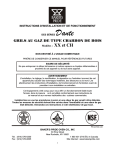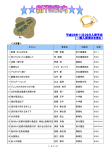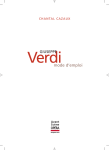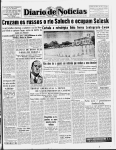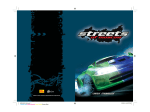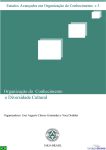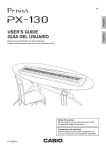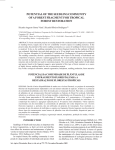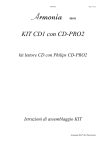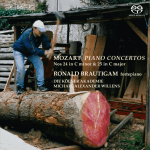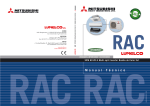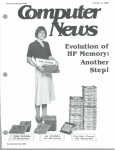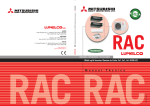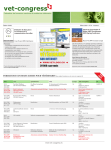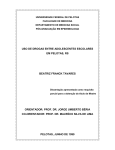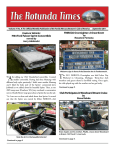Download Number 12, September 1981
Transcript
CLC
newsletter
Number Twelve
September 1981
ISSN 0161-1 ~(04
Thanks to all who contributed to this issue of the Newsletter. The Newsletter is an
occasional publication of the MUsic OCLC User~ Group. Editors: A. Ralph Papakhian,
Sue Stancu, Music Library, Indiana University, Bloomington, Ind., 47405. Communications
concerning the contents of the Newsletter should be addressed to the editors. Correspondence on subscription or ~embership should be forwarded to Richard P. Smiragli a,
Treasurer, Univ. of Illinois at Urbana-Champaign, Music Cataloguing - 2l36 Music Building,
lll4 W. Nevada, Urbana IL 6l80l. Subscription is by membership (dues: $3. 00 for i ndivi dual
members, $5.00 for institutional members: back numbers are available for $l. 50 pe rcopy ).
* ** ** * * *
FROM THE EDITORS
1982 ANNUAL MEETING
In this issue of the Newsletter we
are pleased to publish the papers presented
by Louise Goldberg (Sibley Music Library)
and Jennie Meyer Howard (Kennedy School of
Government Library) at the Feb. lOth, 1981
Annual Meeting session on Reference Uses
of OCLC (Michael Flin g 's presentation was
published in Newsletter no. 11). Also,
because of interest expressed by the membership at the last business meetin g we
are publishing a list of data base entries
that have been analyzed by the OCLC
Musical Recordings Analytics Consortium.
The list was compiled by Richard Jones
(University of Wisconsin--Milwaukee).
Members who find the list useful should
communicate directly to Mr. Jones.·Publication of future lists will denend on
The Annual Meeting has been scheduled
for the first week of February in Los
Angeles, in conjunction with the annual
Music Library Association conference. The
Program Committee has been formed and is
busily at work:
Christina McCawley, Chair (West Chester
State College, West Chester, PA, 1938o,
a show of interest.
'.fe would also like
to point out the useful contribution by
Phil Youngholm: a table for using field
033. Similar contributions, articles,
news items or correspondence from the
membership are welcome by the editors.
The Newsletter should serve as a forum for
the membership to exchan ge ideas about the
effective use of OCLC.
215-436-2454, 436-0720)
Don L. Hixon, Local Arrangements (Univ.
of California, Irvine, Irvine, Calif.,
92717, 714-833-7178)
Linda Fidler (Oberlin College)
Janet Bochin (California State Univ.,
Fresno)
Don A. Henessee (California State Univ.,
Long Beach)
Civia Tuteur (Roosevelt Univ., Chicago)
Laura Dankner (Loyola Uni v. , New Orleans)
Joan G. Anderson (California Institute
of the Arts)
Please send suggestions for program topics
and possible speakers to a:ny of the
committee members, The conuni ttee is particularly interested in speakers residing in
the West. Tentative program topics include:
- 2 -
use of OCLC for resource sharing, ILL,
developing an online catalog, retrocon
projects (special problems with music),
use of OCLC tapes in circulation systems,
and how to train paraprofessionals to
catalog music using OCLC.
MOUG OFFICERS
FINANCIAL REPORT
Vice-Chairperson: Ruth W. Tucker, Catalog
Dept., Olin Library, Cornell University,
Ithaca, NY 14853
607-256-4247
1980 Annual
Balance end 1979
Income
Meeting
2511.95
Memberships 1980 1597.00
Memberships 1981
91.00
4.00
Back issues
Total income 1980
Expenditures
General
340.69
Newsletter
661.04
Meeting
2324.06
Total expenditures 1980
Balance end 1980
$1602.50
4203.95
3325.79
$2480.66
1st Quarter 1981
Balance end 1980
$2480.66
Income 1st Quarter
2940.00
Meeting
1251.00
Memberships
18.00
Back issues
32.27
Interest
Total income 1st Quarter
4241.27
Expenditures 1st Quarter
General
113.39
Newsletter
172.93
Meeting
4556.67
Total expenditures 1st
Quarter
4842.99
Balance end of 1st Quarter
$1878.94
--Richard Smiraglia
MOUG Treasurer
Chairperson: David Knapp, Librarian for
Technical Services, Oberlin College
Conservatory Library, Oberlin, OH 44074
216-775-8280
Secretary/Newsletter Editor: A. Ralph
Papakhian, Music Library, Indiana
University, Bloomington, IN 47405
812-337-8541
Treasurer: Richard Smiraglia, Music Cataloging, 2136 Music Building, University
of Illinois , 1114 W. Nevada, Urbana, IL
61801
217-333-2713
Continuing Education Officer: Christina
McCawley, Green Library, West Chester
State College, Vlest Chester, PA 19380
215-436-2454
COMMUNICATIONS FROM OCLC
Questions and comments about MARC tagging
or OCLC communications should be directed as
follows: member libraries to their respective network offices, independent libraries,
to User Contact Desk, OCLC, Inc. (6565 Frantz
Road, Dublin, Ohio, 43017, 614-764-6000)
New Warning Messages
COCLC regards the new warning messages
as an interim solution to the problem of long
records--expanding the system limits on
record size is still under consideration.
Statistics indicate that these two new
messages will eliminate about 100 terminal
aborts per week--that is the condition which
produces the system response: "The OCLC
system is unable to process your last command
which has caused your processing to be
canceled. Please continue with another
record."J
As many of you are aware, the present
system limitations of 1230 characters in a
variable field, 50 variable fields in a record
and 4096 characters in a record have posed
significant problems to some users who routinely work with long records. If a user
exceeded the limit of 50 variable fields or
4096 characters, the bibliographic record
being input or edited was lost without any
warning.
- 3 -
The present system message MESSAGE TOO
LARGE warns the user that a variable field
exceeds
1230 characters and necessary
follow-up action is described on p. A-18 of
Cataloging: User Manual.
Two new warning
messages, which appear when a user sends a
field that exceeds a system limit, have been
installed to allow the user to make adjustments to the record to bring it within those
limits:
System Message: RECORD TOO LARGE
Meaning: You have reached the system
limit of 4096 in a bibliographic record.
Follow-up action: Do not reformat, produce
or update. Abbreviate the record so that
it contains fewer than 4096 characters.
System Message: TOO MANY FIELDS
Meaning: You have reached the system
limit of 50 variable fields.
Follow-up action: Do not reformat, produce
or update. Delete as many fields as
necessary to reduce the total number of
variable fields to 50.
A Technical Bulletin will be distributed as
soon as possible and these new messages will
be incorporated into future revisions of
Cataloging: User Manual.
Library of Congress Card Numbers for Printed
Music, Books on Music, and Sound Recordings
LCCNs assigned to Library of Congress
cataloging for music, books on music and
sound recordings since the early 1970s have
included the suffixes M, MN, R printed
below the LCCN in the lower right corner of
the printed card. Unlike the prefixes (such
as R and RA) which are an essential part of
the older LCCNs, the suffixes serve no
function beyond sorting National Union
Catalog entries into the proper portions
of the cumulations.
Since the suffixes are printed on the
line below the LCCN, they disappear in the
paste-up process which is used to produce
pages for the NUC cumulation. This m~ans
that OCLC users who input LC copy from
proof slips see the suffixes~ those who
work from LC copy in the cumulation don't
see them.
Users should input the suffix
according to the instructions in the format
documents (Books, p.0:2; Scores, p.0:2;
Sound Recordings, p.0:6-7) if it appears
on the copy they are working from. Do not
sunply the suffix if it doesn't appear on
the copy.
Please do not submit Change Request Forms
solely to add a. suffix to the LCCN in a.
bibliographic record which otherwise matches
LC copy. From time to time, inputting
libraries may receive Change Request Forms
indicating that an LCCN suffix has been
added. This is not an error tallied against
the library but is merely provided for
information.
/
4REFERENCE USES OF OCLC AT THE SIBLEY MUSIC
LIBRARY (Presented Feb. 10, 1981, at
the MOUG Annual Meeting)
I will begin by admitting that our reference use of the OCLC data base is in its
infancy, and that I am sure I will learn a
great deal from the others on the panel and
from the discussion to take place here.
Before I go into detail about our reference use of OCLC, I must say a few words
about our physical setup, both our situation within the library itself, and Sibley's
relation to the main campus library at the
' University of Rochester. Sibley is a fullservice library; we do our own ordering,
cataloging, interlibrary loan, etc. We
have one OCLC terminal, which has been
operational since the summer of 1979, and
which is located in the technical processing area on the first floor. The reference collection and reference staff are on
the second floor. The reference department
handles outgoing interlibrary loan and photocopy requests, and we are allotted a half
hour per day at the terminal for our reference and ILL use. (Incoming ILL and photocopy requests are handled by the circulation/
microform department; they have their own
time slot at the terminal.) At other
times during the day, we can use the terminal
if it is free, and we can call down in an
emergency; members of the catalog staff
have been most accommodating when we call.
Sibley is located five miles from the
main campus, and thus from the main library,
so direct access to their reference collection is difficult. There are many general
reference tools that are not duplicated at
Sibley--NUC Pre-1956, national biographies
and bibliographies, foreign (and some American) libraries' published catalogs, etc.
In order to use these tools, we must either
go ourselves or call and ask a member of their
reference staff to do the searching for us.
Since many music libraries do not have
their own ILL operation, I will say a few
words about interlibrary loan and photocopy requests. The speed and ease of the
OCLC operation is a vast improvement over
the old multi-copy paper form mailed back
and forth. The form must still be used
occasionally, but most transactions are now
computerized. (I might add that Sibley
has never had a telex machine, so I cannot
include that in my comparisons.) The same
information is used in the computer transaction as on the paper forms, but it is
entered directly into the terminal. One
can make the same request for photocopy if the
material is non-circulating; the same copyright compliance codes must be entered; and
one can stipulate maximum charge, special
shipping instructions, insurance requests,
etc. The data base is extremely helpful
when we try to locate copies to borrow.
Without NUC Pre-1956 and other union catalogs,
we often had problems finding locations for
needed items. The frequency of these timeconsuming searches has been greatly reduced.
The speed o f the operation is amazing when
the new and old systems are compared. With
OCLC, the time spent mailing is reduced to
the shipping of books. A borrowing library
sets up a lender string of five libraries
from the OCLC holdings. Once this string
is entered, OCLC does all the work. If
a library can supply the item, that library
sends a message back through the computer
to the borrowing library, and ships the
book. If one library cannot supply, OCLC
automatically sends the request on to the
next library. If all five cannot supply,
then the borrower can pick another lender
string. With the old system, if one tried
to borrow from five libraries (one at a
time, of course!) that meant that five
different paper forms had to be typed, addressed, separated, and mailed, and five forms
had to be returned by the other libraries-a total of ten mailings, and a delay stretching into weeks.
As I said before, our reference use is
just beginning, but we find more and more
uses for the data base every day. I must
state that it is not our only reference
tool, and it will remain only one of many
tools we use. But when a terminal can be
located in the reference area, we will find
ourselves using it more and more often. Our
use at Sibley is tempered by our situation
of having a very large music reference
collection and a comparatively inaccessible
general reference collection. I might also
add that we have made no study of how many
of the questions we receive could be answered by using OCLC.
We have found access to the data base
helpful in a variety of ways. Three specific
areas stand out.
First, we have found OCLC useful as we
try to keep our referenc e collection up to
date. It is simple and quick to f ind out
whether we have the latest edition of a
book, or whether a newer one has been published.
Second, as I mentioned before, the data
base helps us find locations for books
- 5 and scores, and our ILL task has been
made easier. We have found this ability
to locate things useful in other ways as
well. A patron asked us, for example, if
we could find out who owned a certain microform collection of maps--not the usual request
in a music library. We were able to locate
the collection for her, and tell her the
nearest location listed. On a more general
note, we often do searches for people who
write or call. (Do you own ... ? No, but
. .. library does.)
The third area in which we find the data
base helpful is the newly-available authority
file. Members of the reference staff work
closely with students and faculty as they
make out the programs for their recitals.
As a result, we are called upon to provide
dates for some of the more obscure composers,
as well as for poets and librettists. This
search is particularly crucial when there is
a question as to whether someone is still
alive.
A variety of other questions have arisen
which we have been able to answer using the
data base. Several examples will give an
idea of the wide scope of possibilities.
1) A patron asked what pseudonyms Anthony
Burgess used for writing music. A list of
pseudonyms was available in the authority
file, and then we were able to check to see
which of those he used for music.
2) A patron called long distance to find
out how he could obtain the English translation of the Kabalevsky Requiem that was
performed at Eastman some years ago. We
found that it had been published, and we
were able to give the patron the publication
data and a list of libraries owning the score
with the translation.
3) A woman from Massachusetts was visiting her daughter at Eastman, and she came
in to see if we could help her. She is on
the music board of the local orchestra, and
they had invited a young cellist to perform
with the orchestra. She knew that a piece
for cello and piano had been dedicated to him;
she knew the composer, but wanted to know
the name of the piece. We were able to
find the title for her. (This one could have
been answered by looking in our catalog,
as we have the music.)
4) A faculty member called to say that
there was a chance that a well-known American composer would be commissioned to write
a concerto for him, and he wanted to find
out what this composer had been doing over
the last five years or so. The data base,
one of the tools we used, gave us a list of
the most recent publications and recordings.
All in all, the OCLC data base opens new
areas for us in reference. It helps us in
music and non-music areas, and we are making
increasingly frequent use of i t. As more
terminals are placed in reference areas,
access points increase, and reference
librarians continue to learn more about
creative use of all those records in Ohio,
OCLC will continue to grow as an important
reference tool .
--Louise Goldberg
Head, Reference and Rare Books
Sibley Music Library
REFERENCE USES OF OCLC AT THE KENNEDY
SCHOOL OF GOVERNMENT LIBRARY (Presented
Feb. 10, 1981, at the MOUG Annual Meeting)
I should first tell you a little about
the context in which reference is done at the
Kennedy School of Government Library. The
library is new; it's now in only the third
year of operation, and we do all of our own
cataloging and processing. All of the
professional staff have come to the library
and to the school within the last year, and
we are still bending over backwards to sell
the library's services and expertise to the
faculty and administration. Also, since the
Kennedy School of Government Library is one
of 100 libraries at Harvard and is only one
of about eight or nine libraries in the syste
which has material related to public policy
and public administration, we must help peopl
figure out which other Harvard libraries
they should use. The library uses OCLC as
an extension of our catalog for material whic
the library does not own or do e s not cover.
It's also valuable for general reference
for which we do not have the tools, such
as National Union Catalog, or Cumulative
Book Index.
I thought the best way to talk about refE
ence uses of OCLC would be t o de scribe some
specific examples. Of course, the examples
I'll be telling you about all are successful
ones. We tend to forget about th e unsuccessful ones. The reference uses I'll be discus~
ing are finding locations, bibliographies,
biblio graphic verification, s eri al title
changes, and the authority f il e . We do use
the Interlibrary Loan Subsystem and consider
a valuable reference tool, but I'll not be
mentioning it f urther today.
- 6Holdings
Given Harvard's large and complex system,
a frequent use is looking for other Harvard
holdings. Not all of Harvard's libraries
are OCLC users, but calls to the Union
Catalog often get put on very long "hold",
so OCLC is quicker much of the time. Also,
presently, access to the Union Catalog is
only by main entry.
1) The executive Dean of the Kennedy
School, Hale Champion, asked for the Brookings Reprint no. 352, entitled: Jimmy
Carter as Public Administrator. (This was
in November, 1980, after the election!)
Well, our collection of Brookings Reprints
began with no. 353 and we knew no author.
We tried a terminal search in the hope that
we could find the original. The title
search retrieved the record which had a
ni~e 500 note: "Reprinted from Public
Administration Review, v. 39, Jan/Feb 1979."
We had the journal and were able to get the
Dean his article. Incidently, the article
had a different title than the Brookings
Reprint.
2) We found a government publication
in the Government Printing Office reference
fiche. The central Documents Division
said it had been sent to Widener, so we
looked up the record on OCLC to get the
call number. Widener hadn't cataloged it
yet, but the Business School Library had.
Bibliographies
1) The Kennedy School of Government
Library is preparing bibliographies of
the School's faculty, and their compilation begins with OCLC author searches.
2) A request came for either a periodical
article or book chapter by the Harvard
historian, Perry Miller, entitled "The
Romantic Dilemma in American Nationalism
and the Concept of Nature." I warned the
pro~essor s secretary that it might not
be possible since articles and chapters
were not directly indexed, but that it
just might be in a contents note. A
search retrieved 108 records, but the
secretary mentioned that the professor would
be very happy to have a Perry Miller
bibliography, so we printed out truncated
entries of each title. She guessed that
one called Nature's Nation would be likely,
so we looked at only that one full record.
The book did have the chapter listed in
the 505 note, and a holdings display revealed that Widener had the book.
1
Bibliographic Verification
1) A student could find no record of
Hudson's Guide to Washington Media Contacts.
A terminal search by title, with the search
key "hud,gu,to,w" turned up nothing. The
search key " gui,to,wa,m" also provided nothing.
Author/title "huds,guid" --nothing. Finally,
author/title "huds,huds" yielded the record:
Hudson's Washington News Media Contacts
Directory, a title we decided to order on the
student's recommendation.
2) The Houghton-Mifflin Company in Boston,
needed an ISBN for a title: Texas Politics:
Economics, Power and Policy. They called
us because they thought we might have had
the publisher's catalog: John West. They
had tried CBI, and Books in Print without
success. I first tried the terminal search
which turned up the record with the ISBN.
As it turned out we did not have the catalog.
3) Professor Bator was looking for the
book: Climate of Treason, by Andrew Boyle.
Since he had seen the book in England last
summer, he was quite disturbed that he had not
been able to find it in any of Harvard
Square's bookstores. The bookstores could
not identify it in Books in Print or old
British Books in Print. OCLC revealed that
the American edition was published under the
title: The Fourth Man. I recognized it
then as the book which precipitated the revelation of Anthony Blunt as the fourth man
in the Kim Philby conspiracy.
4) Herman Kahn's: On Thermonuclear War
is a classic, but it has been out of print
for a number of years. BIP lists nothing,
but OCLC revealed a 1978 Greenwood Press
reprint.
Serial Title Changes Not Available in Your
Own Catalog
1) The publisher of Strategy Review, a
journal, called to see if we had an address
for another publication called Strategy
Week. We could not find it in our usual
sources and finally tried the terminal. We
found no address, but did find that the
title had come from a recent merge of two
other titles: Strategic Asian Affairs and
Strategic Mid East and Africa. A display of
holdings showed four libraries which held the
title. The publisher called one of those
libraries and did find the address.
2) Our librarian couldn't r emember the new
name of the former Textbooks in Print. OCLC
turned up the new name: El-Hi Textbooks in
Print.
3) A professor in another Harvard library
asked for early l916 issues of the American
- 7
Educational Catalog. The library's catalog
said only that it was issued from 19271955, beginning with the 56th issue. What
had happened to the earlier issues? OCLC
saved the day: A 580 note on the record
for the title said: "Issued 1872-1926
as a number in the Publisher's Weekly."
Authority File
The Library of Congress Name Authority
File has been very useful in the Kennedy
School Library for histories of organizations. This example of a Senate Subcommittee
is typical. (See Name Authority record
n 78008225) The 665 note explains: "The
Disarmament Subcommittee of the Committee
on Foreign Relations of the U.S. Senate was
created in 1955. In 1958, it expired and
was replaced by the Subcommittee on Disarmament. In 1970, the name was changed to
Subcommittee on Arms Control, International
Law and Organization, in 1975 to Subcommittee on Arms Control, International
Organizations and Security Agreements,
and in 1977 to Subcommittee on Arms Control,
Oceans, and International Environment.
(Note the change in scope at that point.) ..• "
I think successful reference use of OCLC
depends on keeping in mind the basic nature
of an on-line system. It consists of files:
1. the LC Name Authority File, 2. The OCLC
Name and Address Directory, and 3. The
Bibliographic File itself. Then, it
consists of access to those files by 1.
title, 2. name, 3. name/title, 4. title as
access point to a related record, and 5.
various numbers: OCLC, LC, ISSN, ISBN,
SUDOC, etc. (The numbers are less useful
for reference purposes.) All the files and
each of the access points have been used to
get the answers we were looking for.
I'll share some other points about our
use of OCLC for reference. First, it's
important to remember that OCLC goes beyond
your own library's catalog. Second, try
to consider the OCLC system as a tool to
be used along with the catalog and the
reference collection, and third, don't
exhaust all your other sources before
trying OCLC; it's far too valuable to be
saved as a last resort. Finally, if you
are worried about interrupting a pre-order
search or cataloging workflow, maybe you
can overcome your guilt by remembering
that it's better to use resources such as
OCLC to provide information that you know
somebody wants. Ordering and cataloging
are only educated guesses as to what
someone will want in the future.
In the Kennedy School of Government
Library, OCLC has been crucial in coming up
with the answers for people who need them
as often as we have. There's just enough
mystery and glamour associated with it that
the library's image has been enhanced as
the place for up-to-the-minute information.
--Jennie Meyer Howard
Head of Library Technical Services
Kennedy School of Government
Harvard University
OMRAC REPORT
At the MOUG meeting in February, there
was a great interest in having a report on
the work accomplished by the OCLC Musical
Recordings Analytics Consortium (OMRAC).
We have prepared the following list which
includes 257 entries, arranged in alphabetical order by manufacturer, each of which
is fully analyzed.
This work was done between January
1980, and January 1981, by the music
librarians and catalogers at the following institutions: Indiana University,
Oberlin College Conservatory of Music,
University of Cincinnati, University of
Illinois at Urbana-Champaign, University
of Wisconsin-Madison, and University of
Wisconsin-Milwaukee. In February three
more institutions were added to OMRAC:
Sibley Library, Eastman School of Music,
University of North Carolina at Charlotte,
and University of Washington.
For more information about this list
or about OMRAC in general, please contact:
Richard E. Jones
Music Librarian
UWM Library
P.O. Box 604
Milwaukee, WI 53201
- 8 -
Abbey LPB 736
Holst: Wilsh Folk Songs, Piano and Choral Works
ABC Audio Treasury
ABC ATS 20011
Beverly Sills Concert
American Wind Symphony
Bicentennial Odyssey, Vol. 3
AWS 104
Flute Recital cin Japan]
Angel AA 8475
COLG 144
Operatic Arias
Alfred Cortot Plays Schumann & Chopin
GR 2197
Twentieth Century Spanish Songs
s 35775
Leonard Pennario Plays Gershwin
s 36070
Romanza
s 36021
Landmarks of Twentieth Century Music
s 36480
The New Age of Bel Canto
s 36933
Perpetual Motion
s 37003
s 37231' 37232,
Showpieces for Orchestra
37250
Renaissance Suite
s 37449
SB 3861
The Art of the Recorder
SBZ 3810
Instruments of the Middle Ages
· Instruments of the Renaissance
SBZ 3810
Lorin Hollander at the Fillmore East
SFO 36025
Ravel: Orchestral Music
SQ 37147-51
FrUhe italienische Violinmusik urn 1600
Archiv 2533 24o
Canti amorosi
2533 305
La guitare royale
2533 365
A Grand Concert of Musick
2533 423
Argo D 101 D 10
Vivaldi: Cimento dell'armonia
The Classic Sound of the Guitar
ZDA 205
To Entertain a King: •••
ZRG 566
Peter Hurford Plays •••
ZRG 783
Philip Jones Brass Ensemble Plays
ZRG 813
Instrumental Music
ZRG 5475
Arion ARN 30 A 113
Les duos d'amor
Prestige de la guitare au XXe siecle
ARN 30 S 150
Organ Masterpieces of the 19th Century
ARN 90414
Music of the 18th Century for Violin and Organ
ARN 90415
The Concertante Violoncello of the 18th Century
ARN 90420
Uenetial Brass Album
Avant AV 1007
The Virtuoso Trumr,et, Vol. 1
Bach Guild BG 616
BGS 553-4 The English Madrigal bchooi, Vol; 1-2
The English Madrigal School,,Vol. 3
BGS 577
The English Madrigal School, Vol. 4
BGS 578
BGS 5041,
The Virtuoso Trumpet.
5043, 70685
Virtuoso Trumpet: cMusic for One, Two and Four
HM 31 SD
Trumpets]
HM 57-8 SD The English Madrigal School
The Virtuoso Trumpet, Vol. 2
HM 63 SD
Bell Laboratories
BTL 7901
Early Hi-Fi
BJR 1431-1433
Maria Callas: soprano assoluta
Cambridge BRS 2516
Frescobaldi: Organ Pieces
Canon CPT 3984
Francis Jackson Plays Organ Music from York Minster
Capitol DP 8686 (SP 8686) The Best of Laurindo Almeida
Duets with the Spanish Guitar
4096371
4445992
6102474
68o6246
5508318
6504948
3620544
4315988
5908775
3101286
2988469
3362733
3612697
444154o
4102911
6664843
6692875
5955129
3545804
6338711
2869963
4342307
6306897
7024273
6655639
3745238
6081937
3382038
6511088
6595490
3553304
6245479
6226583
5948042
2560079
3062744
4015142
6496810
6496818
3148379
3153090
3549967
3490328 &
4750827
6778911
6248222
6468850
5948181
3267800
562'1'110
- 9 -
CBC Radio SM 108
Chalfont C77.099
Columbia CSP P 14171
DMS 461
M 30075
M 32596
M 35119
M3 32135
ML 474o
ML 5116
ML 5206
ML 5875
ML 5984
ML 6338
ML 6379
MS 7166
MS 7085
MS 74o6
Command 154o1 MO
Coronet LPS 3006
U4RM 3758-59
850C-2508
CP2 CP 3-5
Da Camera Magna
SM 91072
Decca DL 710179
193.449
Deutsche Grammophon
104 453
2530 244
' '2530 977
Delos DEL 25406
Desto D 200
DC 6445047
DC 7102-03
Disques Ades 14.033
Discopaedia
MB 1001
MB 1007
MB 1008
MB 1009
MB 1012
MB 1013
MB 1014
MB 1017
Donemus CV 7803
cv 8002
Dorian LP 1006
LP 1007
EMI CSD 3783
EMD 5506
HQS 1140
Patricia Rideout , Contralto, In Recital
6994077
Elgar: The Music of Sir Edward Elgar
6140567
Eleanor Steber in Sacred Arias by the Great Masters 5913588
Nocturne (Philadelphia Orchestra)
4440547
Sunset
6831363
Miniatures for Strings
2823592
Souvenirs
4895105
Robert Casadesus: a Tribute to a Great Artist
3153606
Janacek: Piano Music
6260624
Budapest Quartet Encores
5579804
Overtures
307585?
Sweet Pipes
6219594
PRstorales
3545804
Ritual Fire Dance and Other Best Loved Piano Pieces 6381301
Magnificent Marches
2748403
Horowitz on Television
4859468
Orpheus in the Underworld and Other Favorite Overtures
3024782
Happy Birthday Ludwig
5086937
Virgil Fox Plays the Bladwin Organ
5821983
Willoughby: Flute Solos
699464o
Eugene Rousseau Plays Saxophone
1663626
Harp aujourd'hui
3547048
Piano Space
4029998
5636818
FrUhe Musik aus Frankreich
Segovia: The Guitar and I
6724682
Nationale Muziekwedstrijd Pro Civitate, Brugge, 1965 4064989
Five Famous Concertos for Trumpet
Aufforderung zum Tanz
Strauss: Kaiser-Walzer •••
Boston Musica Viva Plays
The Art of _Robert Goldsand
An Anthology of American Piano Music (1780-1970)
Natalie Hinderas Plays Music by Black Composers
Hahn: Melodies
6504163
3184161
7030686
3145196
6394207
2844213
6899160
6696810
Jan Kubelik, cvol. 1 J
Toscha Seidel, cvol. 1J
Efrem Zimbalist, cvol. 1]
Albert Spalding, cvol. 1J
Fritz Kreisler, cvol. 1J
Yehudi Menuhin, cvol . 1 J
Nathan Milstein, cvol . 1]
Georges Enesco: cthe U.S. Columbia Discs - Complete]
Anthology of Dutch Electronic Tape Music, Vol. 1
Netherlands Saxophone Quartet
Contemporary American Piano Classics
Contemporary American Chamber Music
Elgar: Five Part-Songs from the Gre ek Anthology
cand ···J
Voices for Today
Composers of the Chapel Royal
6168102
7001622
7002164
6996211
6102310
6394845
6094988
6102310
6000625
7092846
6395418
6395441
5462992
5628301
5883579
.•
- 10 -
Zabaleta Harp Sampler
Esoteric ES 1501
International Piano Festival
Everest LPBR 6128
Organ Concert
SDBR 3120
The Young Fritz Kreisler Violin Recital
SDBR 3258
Experiences anonymes
EA 0026
Spanish Keyboard Music of the 16th & 17th Centuries
Folkways FTS 32378
Music for the Colonial Band
FTS 33902
New Americ ~n Music : ••• , vol . 2
FTS 33903
New American Music: ••• , vol . 3
FTS 33904
New American Music: ••• , vol. 4
FX 6160
Sounds of New Music
Gemini Hall RAP 1010 Woman ' s Work
Golden Crest CR 4023 The New York Brass Quintet in Concert
RE 7022 Oboe Recital
RE 70 23 The Flute in Its Showcase of Styles
RE 7040 Donald Knaub , Bass Trombone ;
RE 7055 Richard Lottridge , Bassoon
Gr and Orgue RLM 760 910 Musique suisse de l ' orgue
Gr enadilla GS 10o6
The French Clarinet School
Guild GRSP 7012
Sunday at St . Paul ' s
Ha rmonia Mundi
HM 396- 98
Troubadours
HM 580
Orgues historiques
HMU 901
Hardy: Trompette et argue
1C 151 99- 651 - 52
Mozart : Klaviersonaten , Fantasien u . a .
Hessound S 1001 - 02
Britten : A Concert in Memory of Benjami n Britten •••
HMV (His Masters Voice)
CSD 3565
Herefors Cathedral
HQS 1091
A Pageant of English Song , 1597- 1961
The Art of Euphonium Playing , Vol . 2
Hoe PDB 816
Hungaraton SLPX 11972 The Classical and Baroque Bassoon
Illinoi s Wesleyan
Choral Music of the Twentieth Century
University CC 3
Chamber Works , Vol . 1
Kiwi SLD 30
The Virtuoso Violin
Klavier KS 503
20th Century Harp
KS 507
In Rhythm
Lark INL 3595
Pianist Sedmara Zakarian (Sedmara Rutshstein)
Laurel LR 01150
cTebaldi in Stereo Sound]
London OS 25020
Jamestown
College Choir
Mark MC 52o6
Screamers!
Mercury SR 90314
Sors : Guitar Music by Fernando Sors
Meridian E 77006
Tarrega : Guita1 Music by Francisco Tarrega
E 77 - 26
Reicha: Kammermusik fur Blaser
MPS 88 011 - 2
The Legendary Soviet Pianist Lazar Berman
Murr ay Hill 943942
Contemporary Music for the Guitar
Music Guild MS 871
Mus ica Bavarica MB 305 Schwabische Klosterkomponisten des Barock
1746856
4930825
5620349
3269773
4049238
3904149
6343634
6389715
546244o
2193900
3370295
829825
2094891
5091869
3075145
5725015
5456085
5761748
6998758
5115592
5460240
7034152
6465742
4443002
68o6296
6030774
3460253
6010837
6151212
6411787
408o953
3743426
6185533
6482928
3048661
4921137
5149403 ,
5247480 '
5259777 &
6343853
5873774
5838940
7072568
4179998
6721366
7047114
- 11 -
Musicaphon BM3QSL1319
BM30SL1321
BM3QSL1536
BM30SL1944
Musical Heritage
MHS 766
MHS 755
MHS 931
MHS 1071
MHS 1126
MHS 1176
MHS 1428
Schutz: Geistliche Chormusik
Schein: Inrealbrunnlein
Barocke Trionsonaten
Burkhard: Lyrische Musik
The Birds and the Bees
Six Trumpet Concertos
Sacred Music in the Ro;;al Chapel at Versailles
Music at the English Royal Court
American Colonial Christmas Music
Music for Trumpet and Org~1
Ernesto Bitetti Plays Four Centuries of Italian
Guitar Music
MHS 1442
French Music of the Middle Ages and the Renaissance
Fanfares from Six Centuries
MHS 1785
MHS 1844
Contemporary Music for Harp Ensemble
The Art of the Vielle
MHS 3700
Boismortier: Sonatas for Bassoon and Continuo
MHS 3858
Muza SXL 0106
Arie operowe
A Nonesuch Treasury of Americana
Nonesuch H 7 - 14
Music from the Chapel of Philip II of Spain
H 71016
0 Great Mystery : •••
H 71026
Triosonatas of the Late Baroque
H 71085
and Other Madrigals
Monteverdi : Il combattimento
H 71090
Renaissance Music for Brass
H 71111
Baroque Fanfares and Sonatas for Brass
H 71145
Masque Music : • • •
H 71153
Voices of the Middle Ages
H 71171
Baroque Masterpieces for Trumpet and Organ
H 71279
Willaert : Motets cfor four voices]
H 71345
Odeon PHQS 114o
Composers of the Chapel Royal
Composers of Hatfield House and Hengrave Hall
PHQS 1151
3C 163 50104-06 Michelangeli
Final Scene from Salome and Other Opera Favorites
Odyssey 32 16 0078
New Music in Quarter Tones
32 16 0162
Music of the American Moravians
32 16 0340
Oiseau-Lyre DSLO 510 Cozens Lute Book
DSLO 514 Purcell : Works •••
OLS 176
Music for Harp
Organa PHON E 10001
Die Scholer-Orgel in ehemaligen Kloster •• •
PHON E 10007
Die Oberlinger-Orgel in der Benediktiner-Abtei
Piano Music of Latin America
Orion ORS 7286
Art of the Trumpet
Orpheus OR 338
Historic
Harpsichords and Clavichords
Oryx 1725
EXP 60
Organ Master Works
Barab: A Recital of New Music
Paradox PL 10001
Peerless ORYX 1720
Music from the Mannheim Court
ORYX 1722
Music from the Court of Duke Carl Theodore
Toccatas pour piano
Philips 6504 077
Violin Romances
658o 047
Janet Baker
6767 001
Arie
amorose
9500 557
Pleiades P 103
Chamber Music for Soprano and Continuo
6597879
6597924
6417712
7012657
3226218
."3237028
304o976
3124244
3078587
3116943
3583877
3092612
3570213
3496037
6448746
4448279
570084o
4335521
877426
530903
2956904
2998703
2133622
3509204
3473566
3135474
1083473
3866005
5883579
6426843
6482993
6407899
1083761
3139900
4480463
4754984
6081881
6899221
6899275
5761646
3521518
6538768
6623536
7023104
5701121
5701481
6599630
556488
6335192
4886236
876842
- 12 -
Point P 5008
Lyllof: Bent Lyllof Presents the Malmo Percussion
Ensemble
Coronation Music
Nicholas Danby cat the] Organ of Marie nkirche , •••
Operatic Re cital
Pye PCNHX 10
TPLS 13056
Qualiton SLPX 11410
Rare Recorded Editions
SRRE 140
Les morceaux de salon pour le piano
RCA Victor (& Red Seal)
ARL 2 2359
The Artistry of Artur Rubenstein
DPL 3 0123
The Philadelphia Orchestra European Tour c1975J
LCT 10
Rosa Ponselle in Opera and Song
LM 2379
Roberta Peters in Recital
LM 6014
Horowitz : 25th Anniversary of His American Debut
LSC 2964
20th Century Guitar
LSC 3081
Alleluia
LSC 3232
Heifetz Showpieces
LSC 3234
Heifetz Concerto
LSC 4014
My Favorite Concertos
Ren HR 5073
Recital Solos for String Bass
Reper t oire Recording··Society
RRS12
The American Collection
Saga SAGA 554o
Boyce : Anthems and Voluntaries
Scala 844
Leo Slezak , Vol . 2
Schwann VMS 2056
Haydn : Concertos for Harpsichord .
Seraphim M 60040
The Art of Dennis Brain cVol . 1]
S 60215
Coloratura Arias from French Opera
Studio 74 MAS 026
Datn : Album fur die Jugend • ••
Supraphon SUA ST 50582 Modern Chamber Music for Wind Instruments
1 12 1143
Smetana : Smetana Choruses
T & R RB 9807
Richard Anthony Zgadara , Harpsichord/Piano
Telefunken 6 . 35 067
Fruhe Musik (subdivided entries; orig . 2727205)
Fruhe deutsche Musik • ••
Fruhe Musik in England •••
Musik des Trecento •••
Pariser Theaterlieder des 15. Jahrhunderts
Historische Clicquot-Orgeln in Frankreich
6. 35 293
6 . 42 156
Musica baroca es panola
English Madrigals from the Courts of Elizabeth I
Turnabout TV 34202
and James I
TV 34224- 25 Liszt: Piano Music
TV 34308
Danish Thaetremusic
TVS 3438o
Love and Dalliance in Renaissance France
UBRES CS 303
Wyatt: Four for Flute
EN 203
Powell : Music, Brasses, Percus sion
U. S. Air Force 101878 The United States Air Force String Orchestra
U. S . Marine Corps .
The United St ~tes Marine Band Pres ents Marches from
Around the World
The United States Marine Band in Concert
Universal Ed . UE 15043 A Garland for Dr . K.
Valois MB 17
Musique sacre et profane des XVI et XVIIemes siecles
6994210
5589860
6417524
6700994
6951897
5419543
4166o8o
5326705
3795222
3087220
3244036
4090768
4164910
6617224
6261963
5624533
5435595
4061533
5636905
7030686
6393057
3509648
7031641
5761489
5725287
6504102
6512287
6512265
6512319
6512351
7047134
4326811
2950011
3137010
3419027
2610027
6998441
6994715
6160918
5327547
5327532
7023991
5399887
- 13 -
Lindley : Romantic Organ Music f rom Leeds Parish Church 7012657
Goodman : The Organ at Hull City Hall
7031 525
The Organs of Eton College
5761 561
WGS 8402- 2 Mo~nrt ••. Requiem
701?6 '.17
WGS 8216 Music for Voices and Viols in the 'l'ime of 0hakespeare 3~49375
The Los Angeles Clarinet Society
4279591
443()686
Los Angeles Philharmonic Trombone Ensemble
Vista VSP 1026
VSP 1042
Wealden WS 144
Westmins·l, cr
WIM WIMR 7
WIMR 12
- ADDENDUM Bach Society BGS 70685 The Virtuoso Trumpet , Vol . 3
Bath University BUR 1001 Eighteenth Century Keyboard Music
Zuke r man Plays Kreisler
Columbia M 31378
Mark MC P,)OQ
Recital : Gene Ford , Tenor
6169 )08
6798528
3455593
67?03?2
OCLC ONLINE UNION CATALOG STATISTICS BY FORMAT
(As of 1981 May 22, from Rits ~Pieces, no. 24)
Type of Material:
Rooks
Serials
Audiovisual
Maps
Manuscripts
Sound recordin gs
Scores
Total
Number of Records
Percentage of Total
6,111,680
45Cl,l44
1G7 ,161
83,886
24,253
171,339
141,433
85.77
6 .24
2 .27
1.14
0.33
2 .33
1.92
7,35R ,896
100.00
OCLC ONLINE UNION CATALOG STATISTICS: AUDIOVISUAL FORMAT
(As of 1981 May 22 , from Rits ~Pieces, no. 24)
Type of Material:
Number of Records
Principal Audiovisual Media (Type "g")
Filmstrip ("f)
47,894
Motion Picture ("m")
55,493
Slide ("s") .
21,761
Transparency ( "t")
3 ,2n6
Virleorecorrlin r: ("v")
n ,oRn
Subtotal
140,501
Special Instructional Material (Type "n")
Diorama ( '' d")
51
Game ("g")
1,998
Chart ( "n")
978
Flash card ( "o")
295
Mic roscope slide ("p")
n
Model ("q")
419
Reali a ( "r")
1,985
5,741
Subtotal
Kit (Type "o", Type of
Material "b")
4,160
other ("z")
2,798
Unknown ("u")
4,957
Grand Total
167 ,161
Percentage of Total
28.65
33.20
13.02
1.95
1 ? .h?
flCJ .44
0.03
1.19
0.58
0.18
0.01
0.25
1.19
3.43
2.49
1.67
2.97
100.00
- 14 -
TABLE FOR FIELD
033---RE}~RKS
I prepared this table for my own quick reference, since I do
not have ready access to the LC Class G schedule.
It is not a complete
substitute for the schedule, but should be regarded as either a ready
reference for those numbers which it does contain, or an aid which will
permit some catalogers to use field 033 who might not otherwise be able
to do so at all.
For practicality's sake, I limited the table to two sides of a sheet
and omitted many countries in doing so.
The list as it stands is weighted
in favor of the codes I expected to want--essentially the Americas and
Europe, though major Asian and African countries do appear.
Likewise,
to save space, the list addresses the coding of countries and cities
(or towns) only.
It
~s
possible to code for other political and geo-
graphic areas, and also for regions and even buildings within cities,
but the table does not provide for this coding.
The instructions given at the head of the table are complete in
themselves, and if followed to the letter will enable you to code for
country or city without reference to the LC Class G schedule.
read the instructions very carefully, and note the caveats.
Please
No examples
are given, because the OCLC format document contains several examples.
The table will not be of much use in coding for musics-other-thanWestern-art.
Access to the geographical area represented by a musical
tradition is properly by fields 043 and 052, however, and my concern
was with 033 alone.
The table may, however, as far as it goes, be
used to code for 052; in this case the four-digit number would go in
Ia and the city cutter in lb.
The same caution as to other geographic
and political areas applies--it is possible to code for them (and rather
more likely that one would need to, in 052), but not from this table.
The cutter numbers given are taken directly from the Class G
schedule.
There are very few cutters printed in the schedule, but,
even so, not all are given here.
Philip Youngholm
Greer Music Library
Connecticut College
- 15 c
TABLE FOR FIELD 033, SUBFIELDS b AND c
1. To code for a country, state of the U.S., or province of Canada:
enter in subfield b the digits preceding the slash.
2. To code for a city or town: enter in subfield b the first three
digits plus the digit after the slash; then cutter for the city or
town in subfield c.
3. Do no~: a) use a cutter in subfield c with a number in subfield
b that ends in 0 or 5; b) use a number in subfield b that ends in 4
or 9 unless you also use subfield c; c) attempt to subdivide by county,
region, or any other political or geographical subdivision than city
or town on the basis of this table; d) code for an island from this
table, unless its name appears here (for the last two cases go directly
to the Class G tables).
Albania 6830/4
Argentina 5350/4
Australia 8960/4
Austria 6490/4 (V4, Vienna)
Belgium 6010/4
Bolivia 5320/4
Brazil 5400/4
Britain 5740*
Bulgaria 6890/4
Canada 3400*
Alberta 3500/4
British Columbia 3510/4
Manitoba 3480/4
New Brunswick 3430/4
Nova Scotia 3420/4
Ontario 3460/4
Prince Edward Island 3440/4
Quebec 3450/4
Saskatchewan 3490/4
Chile 5330/4
China 7820/4
Colombia 5290/4
Cuba 4920/4
Czechslovakia 6510/4
Denmark
6920/4
East Germany 6090/4**
Ecuador 5300/4
Egypt 8300/4
England 5750/4
Europe 5700*
(L7, London)
Finland 6960/4
France 5830 (P3, Pari s )
Germany 6080*
Germany, East
Germany, West
Great Britain
Greece 6810/4
Holland
Hungary
**
6090/4 (B3, E. Berlin)-:,*
6295/9 (B3, w. Berlin) id<
5740*
6000/4
6500/4
Iceland 6930/4
India 7650/4
Ireland 5780 (D7, Dublin)
Ireland, Northern 5790/4
Israel 7500/4
Italy 6710/4 (R7, Rome)
Japan
Mexico
7960/4
4410/4
(M6, Mexico Ci ty)
Netherlands 6000/4
New Zealand 9080/4
Northern Ireland 5790/4
Norway 6940/4
*This number may not be subdivided by city; use the number for the
province (e.g. Ontario) or country (e.g. England) to subdivide.
**See note on Germany, next page.
- 16 -
Paraguay 538014
Peru 531014
Poland 652014
Portugal 669014
Puerto Rico 497014
United States (continued)
Michigan 411014
Minnesota 414014
Mississippi 398014
Missouri 416014
Montana 425014
Romania 688014
Russia 700014 (L4, Leningrad)
Scotland 577014
Spain 656014
Sweden 695014
Switzerland 604014
Taiwan
7910/4
USSR 700014 (L4, Leningrad)
United Kingdom 5740*
United States 3700*
Alabama 3970 I 4
Alaska 437014
Arizona 433014
Arkansas 400014
California 436014
(S5, San Francisco)
Colorado 431014
(D4, Denver)
Connecticut 378014
Delaware 383014
District of Columbia
Florida
393014
Georgia
392014
Hawaii
438014
Idaho 427014
Illinois 410014
Indiana 409014
Iowa 415014
Kansas 420014
Kentucky 395014
Louisiana 4010 I 4
(N5, New Orleans)
~1aine
3 7 3014
Maryland 384014
Massachusetts 376014
Nebraska 419014
Nevada 435014
New Hampshire 374014
New Jersey 381014
New Mexico 432014
New York 380014
(N4, New York City)
North Carolina 390014
North Dakota 417014
Ohio 408014
Oklahoma 402014
Oregon 429014
Pennsylvania 382014
(P5, Philadelphia)
Rhode Island
377014
South Carolina 391014
South Dakota 418014
Tennessee 396014
Texas 403014
Utah
385014
L: 34014
Vermont 375014 .
Virginia 388014
Washington 428014
West Virginia 389014
Wisconsin 412014
Wyoming 426014
Uruguay
537014
Venezuela 528014
Virgin Islands (U.S.)
501014
Wales 576014
West Germany 629519**
Yugoslavia
684014
*This number may not be subdivided by city; use the number for the
state (e.g. New York) or country (e.g. Wales) to subdivide.
**Germany: use 6080 for pre-partition Germany, or if E or W is unknown;
for Berlin use 6299 B3 unless E Berlin is specifically intended.
- 17 -
Music OCLC Users Group
APPLICATIOtJ FOR NEW MEMBERS
Personal membership is $3.00; Institutional membership is $5.00. Membership
includes subscription to the Newsletter. New members receive Newsletter no.
11 and any mailings from date of joining through December, the end of the membership year (issues are mailed on receipt of payment of dues). Personal members please prefer home address; institutional members note the four line, 24
character per line limit.
NAME:
MAILING ADDRESS:
TELEPHONE: (___) -
ext.
NETWORK:
INSTITUTIONAL
AFFILIATION:
BILLING ADDRESS:
Check one:
Enclosed is a check for membership dues:
$3.00 individuals
$5.00 institutions
Please bill (institutions only)
Are you presently a member of the Music Library Association?
yes
no
Please return completed form and check made payable to MUSIC OCLC USERS GROUP
to :
Music OCLC Users Group
Richard P. Smiraglia, Treasurer
University of Illinois at Urbana-Champaign
Music Cataloguing- 2 1 36 Music Building
1114 W. Nevada
Urbana IL 61801
-..,
_....
·~
MOUG
Newslett
A. Ralph
p
er no. 12
Sue St
apakhi an
ancu
Indiana U .
Music Lib~~versity
Bloomingt
47405
on,ry Indiana
I •
"
'J
.
-
,t.,l.-l
•
I
.
- '""
SUSANNE
GAYlORD BELL
6500 FOF~~;rc LIBRARY
S'I . LOUIS MO
H AVE63105
f\RS1 Cli\SS


















